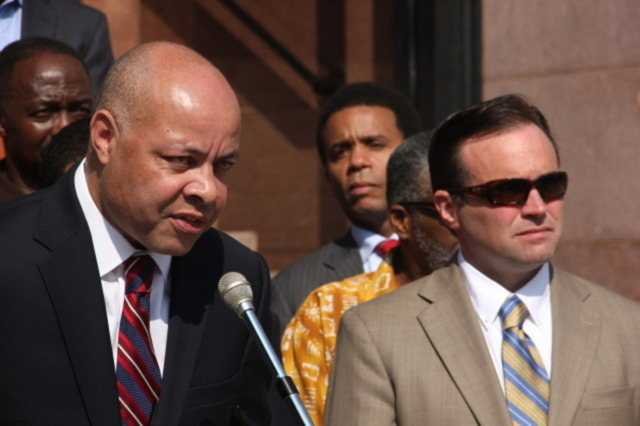A leaked audit, a gender discrimination suit and charges by Cincinnati City Manager Harry Black that a small group of Cincinnati police is corrupt have all led to the dismissal of one of the city’s top cops and a reported push by Mayor John Cranley to oust Black.
Sources within City Hall, confirmed by several news outlets, said March 9 that Cranley asked Black to resign from his post, and that Black refused. Cranley picked Black for his role as city manager in 2014. The city manager could get get more than $150,000 in severance pay if he is let go.
The drama stems from the release of an unfinished audit around overtime pay within the Cincinnati Police Department. Black has said that the release of that document was an attempt by a "rogue element" within CPD to get CPD Chief Eliot Isaac fired.
Cincinnati City Council must vote on the removal of the city manager, and it’s unclear if five council members would vote to do so. Council members P.G. Sittenfeld and Wendell Young have expressed support for Black. Prominent civil rights groups, including the NAACP, have released statements pledging support for Black and demanding a meeting with Cranley on reports he asked him to resign.
"We support City Manager Harry Black and Chief of Police Eliot Isaac in the performance of their duties in accordance with the city charter," a statement from the NAACP, the Black United Front, The Sentinels and several elected officials said. "The deeper issue is the internal improprieties that have taken place inside of the Cincinnati Police Department, and the culture that currently exists, with individuals trying to subvert the chief and and undermine the city manager by leaking internal documents to the media."
Cranley’s office released a statement March 10 saying the mayor was out of town. There was no further comment on the city manager’s job, though the statement did note that the mayor supports Chief Isaac.
How did City Hall get so turbulent? It goes back to CPD.
Chief Isaac wrote a March 7 memo to Cincinnati City Manager Harry Black pushing back on a leaked draft of an audit of the department’s overtime policies.
The Cincinnati Enquirer published a story March 6 pulling from the allegedly unfinished audit, raising ire from Isaac and Black. That audit was the result of an earlier department-wide review in 2016 that recommended periodic district-level reports on overtime spending to correct issues with the department’s overtime system.
That audit is connected to another controversy within the department — a gender discrimination claim with the federal Equal Employment Opportunity Commission by District 5 Commander Capt. Bridget Bardua alleging harassment from other officers, including inspections unit commander Jeff Butler, who led the audit. According to Bardua’s gender discrimination complaint, Butler and assistant chiefs Paul Neudigate and David Bailey were working to get Isaac and Bardua removed. The involved officers have denied this assertion.
Bardua made roughly $80,000 on overtime and other non-salary compensation last year, according to the audit, roughly $20,000 more than other district commanders. Two sergeants in Bardua’s district together made about $90,000 in overtime last year, the audit claims.
But the audit hasn’t been fact-checked by the city and CPD’s finance manager was never asked to confirm amounts included in the review, Isaac wrote in his letter to Black, who agrees with those assertions.
“Though the subject of a newspaper article, this audit has not been formally released by CPD or city administration,” Black wrote in a memo to Mayor John Cranley and Cincinnati City Council. “This is because the audit remains incomplete and requires a number of caveats in order to be properly understood.”
Isaac also took issue with a central element of The Enquirer’s story — an unattributed assertion by the paper that CPD has gone $1.8 million over budget by spending $7.4 million on overtime pay. Isaac says the department hasn’t gone over budget at all during his time as chief and called The Enquirer’s number wrong.
In a series of text messages to Cincinnati City Council members, Black called The Enquirer “complicit” in an effort by a “rogue element” of officers within the Cincinnati Police Department he says are corrupt and working to undermine CPD Chief Isaac, perhaps motivated in part by race. Black hasn’t named the CPD employees he says have gone rogue. The city manager also said in those text messages that he’s mulling getting the U.S. Attorney’s office involved in the matter.
On March 8, revelations came that assistant chief Bailey was taking a buyout and leaving CPD immediately. Fraternal Order of Police President Dan Hils charged that Bailey was being “forced out” by Isaac and Black. The city will pay Bailey’s salary, benefits and vacation time until his slated retirement date in 2020 — a package worth roughly $400,000.
Hils has said there’s no evidence of any rogue officers within CPD. Mayor John Cranley asked for more evidence backing up Black’s claims. He called Bailey’s firing “sad.”
Some Cincinnati City Council members also expressed consternation at the move.
“I’ve worked with Lt. Col. David Bailey for over 6 years now,” Councilman Chris Seelbach tweeted March 8. “He’s a good guy who has served our City well. Disappointing to again see City Manager Harry Black dismiss someone with little respect for their service. The Lt. Col. and our City deserves better.”






